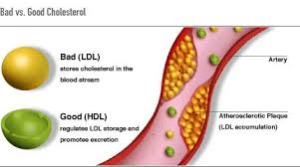Cholesterol helps your body build new cells, insulate nerves, and produce hormones. Normally, the liver makes all the cholesterol the body needs. But cholesterol also enters your body from food, such as animal-based foods like milk, eggs, and meat. Too much cholesterol in your body is a risk factor for heart disease.
There are two forms of cholesterol that most Americans are familiar with: Low-density lipoprotein (LDL or “bad” cholesterol) and high-density lipoprotein (HDL or “good” cholesterol.) These are the form in which cholesterol travels in the blood.
LDL is the main source of artery-clogging plaque. HDL actually works to clear cholesterol from the blood.
Triglycerides are another fat in our bloodstream. Research is now showing that a high levels of triglycerides may also be linked to heart disease.
Atherosclerosis : Atherosclerosis hardens and clogs arteries leading to the heart, brain, arms and legs. When it affects the arteries of the heart, it causes coronary artery disease which can result in chest pain, weakness, perspiration, shortness of breath and heart attack.
This slowly progressing disease is the cause of nearly 75% of all heart-related deaths. Excess fat, calcium, cholesterol and other substances buildup deposits on arterial walls forming plaque. When plaque hardens, the arteries become hard and inflexible. Risk factors of atherosclerosis include high cholesterol, high blood pressure, smoking, obesity, lack of exercise, eating a diet rich in saturated fats, females after menopause etc.
Stroke : Blood supply to the brain can get disrupted due to a blood clot or when a blood vessel bursts spilling blood into gaps in the brain cells. The first is called an ischemic stroke and the secondhemorrhagic stroke. This prevents nutrients and oxygen from reaching the brain, or bleeding around the brain and causes cell death. Strokes can cause permanent or temporary neurological impairment.
High cholesterol itself does not cause any symptoms, so many people are unaware that their cholesterol levels are too high. Hence, it is important to find out what your cholesterol numbers are. Lowering cholesterol levels that are too high lessens the risk for developing heart disease and reduces the chance of a heart attack or dying of heart disease, even if you already have it.
Some recommend that everyone over age 20 should get theircholesterol levels measured at least once every 5 years. The test that is performed is a blood test called a lipoprotein profile. That includes:
- Total cholesterol level
- LDL (the “bad” cholesterol)
- HDL (the “good” cholesterol)
- Triglycerides



